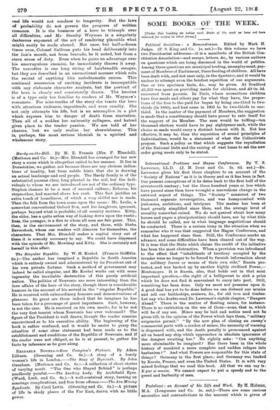International Problems and Hague Conferences. By T. S. Lawrence, LL.D.
(J. M. Dent and Co. 3s. 6d. net.)—Dr. Lawrence gives his first three chapters to an account of the " Society of Nations " as it is in theory and as it has been in fact. Our present conceptions of it he dates back to the first half of the seventeenth century ; but the three hundred years or less which have passed since then have wrought a marvellous change in the outward aspect of things. The "Society" consisted of two thousand separate sovereignties, and was honeycombed with jealousies, ambitions, and intrigues. The matter has been at least greatly simplified since then, and the average level of morality somewhat raised. We do not quarrel about how many horses and pages a plenipotentiary should have, nor by what title he should be called, nor in what language negotiations should be conducted. There is a certain irony in the situation when we remember who it was that suggested the Hague Conference, and what has happened since then. Still, the Conference marks an advance, and some difficulties have been cleared out of the way. It is true that the State which claims the credit of the initiative has been the most obstructive. When a provision was introduced to the effect that "inhabitants of territory occupied by the invader were no longer to be forced to furnish information about the military forces or means of their own side," Russia pro- tested, and was backed up by another highly civilised Power,— Montenegro. It is Russia, also, that holds out in that most important question,—the right of a belligerent to sink a prize which he does not find it convenient to carry into port. Still, something has been done. Only we must not presume upon it. A good deal has yet to be done before we can disband our armies and sell our battleships, cruisers, &c., for old iron and timber. Let any who doubts read Dr. Lawrence's eighth chapter, "Dangers Ahead." There is the matter of floating mines, for instance. There is no restriction on the use of them—none, that is, which will be of any use. Mines may be laid and notice need not be given till, in the opinion of the Power which lays them, " military exigencies permit." " By the new plan of closing an enemy's commercial ports with a cordon of mines, the necessity of warning is dispensed with, and the, death penalty is pronounced against all on board any ship which approaches in absolute ignorance of the dangers awaiting her." He rightly asks : " Can anything more abominable be imagined ? Has there been in the whole history of mankind a more complete and sudden relapse into barbarism ?" And what Powers are responsible for this state of things ? Germany in the first place ; and Germany Was backed by Russia, France, and even the United States. It is with very mixed feelings that we read this book. All that we can say is : E pur ti muove. We cannot expect to put a speedy end to the greed and barbarity of men.


































 Previous page
Previous page